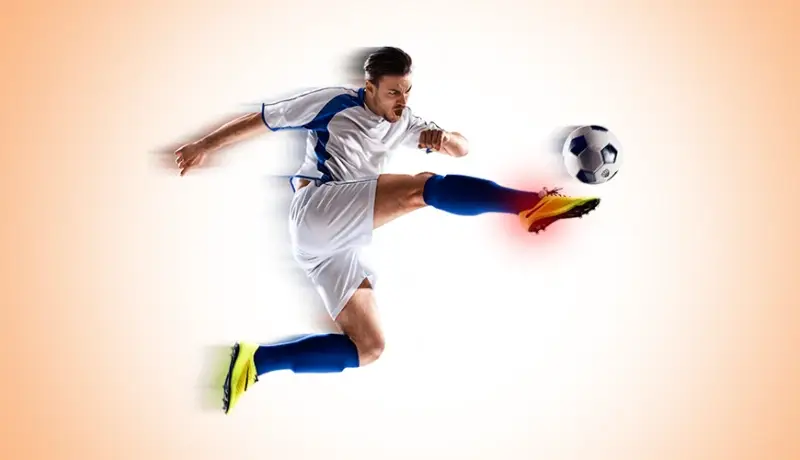Sports Injury Physiotherapy In Islamabad
Sports injuries are a common occurrence for both amateur and professional athletes. Whether you are a runner, swimmer, or participate in contact sports, injuries can happen suddenly and may require specialized care to heal properly. At Physiatrics Pain Clinic, we understand the unique demands of athletes and are equipped with the latest machines and physical therapy techniques to help you recover from sports injuries quickly and effectively. Our goal is to not only treat your injury but also strengthen and condition your body to prevent future injuries, ensuring you can return to your sport stronger than ever.
Book online consultation or visit us for Sports Injury Physiotherapy in Islamabad at Physiatrics Pain Clinic, 4th Floor, Safa Gold Mall, F-7 Markaz, Islamabad
One of the most frequently affected areas in sports injuries is the shoulder. Athletes involved in overhead sports such as tennis, baseball, swimming, and weightlifting are particularly prone to shoulder injuries. In this blog, we will focus on the main causes of shoulder pain related to sports injuries and how our clinic can help alleviate the pain and aid in recovery.
The shoulder is a complex and highly mobile joint, making it susceptible to injury, especially in athletes who perform repetitive motions or experience impact. Here are some of the most common reasons athletes suffer from shoulder pain:
- Sprains and Strains: Sprains occur when the ligaments that connect bones are overstretched or torn, while strains involve the overstretching or tearing of muscles or tendons. These injuries are common in almost any sport and can affect areas like the shoulders, knees, and ankles. Sprains and strains cause pain, swelling, and difficulty in moving the affected joint or muscle.
- Knee Injuries: Knee injuries are among the most frequent sports injuries, particularly in sports like soccer, basketball, and running. They can range from mild strains and sprains to more severe issues like ACL (anterior cruciate ligament) tears, meniscus injuries, or dislocated kneecaps. Knee injuries can cause instability, swelling, and pain, limiting an athlete’s mobility.
- Swollen Muscles: Muscle swelling, or inflammation, often occurs after intense physical activity or trauma. Overworked muscles can become painful and swollen, leading to limited movement and discomfort. In some cases, swollen muscles can also indicate more serious underlying injuries, such as strains or tears.
- Achilles Tendon Injuries: The Achilles tendon, which connects the calf muscles to the heel, is a common site of injury, especially in runners or athletes who engage in jumping sports. Achilles tendinitis (inflammation of the tendon) and Achilles tendon ruptures are painful conditions that require prompt treatment to prevent long-term mobility issues.
- Shin Splints (Medial Tibial Stress Syndrome): Shin splints, or pain along the shin bone, are common in runners and athletes who engage in activities with repetitive foot impact. This condition is often caused by overuse, improper footwear, or running on hard surfaces. Shin splints cause pain and tenderness along the front of the lower leg and can limit an athlete’s ability to continue training.
- Rotator Cuff Injuries: The rotator cuff consists of muscles and tendons that stabilize the shoulder. Repetitive overhead motions, such as those in tennis, swimming, or baseball, can lead to rotator cuff tendinitis or even tears. These injuries cause pain, weakness, and limited range of motion in the shoulder, making it difficult for athletes to perform overhead activities.
- Dislocations: Shoulder dislocations are common in contact sports like football, rugby, and wrestling. A dislocation occurs when the upper arm bone pops out of the shoulder socket, causing intense pain and instability. Once a shoulder has been dislocated, it becomes more susceptible to future dislocations unless properly treated and rehabilitated.
At Physiatrics Pain Clinic, we offer a comprehensive range of services designed to help athletes recover from sports injuries, including shoulder pain. Our approach combines advanced technology with personalized physical therapy to ensure a safe and effective recovery. Here’s how we can help:
- Comprehensive Evaluation and Diagnosis: The first step in treating any sports injury is to perform a thorough assessment. Our team will conduct a physical examination and may use diagnostic imaging, such as X-rays or MRIs, to accurately diagnose the extent of the injury. Once we have a clear understanding of the issue, we’ll develop a customized treatment plan tailored to your specific needs and goals.
- Advanced Therapeutic Machines for Faster Healing: We use the latest technology to speed up the healing process and reduce pain. Some of the advanced therapeutic machines we offer include:
- ◦ Ultrasound Therapy: Ultrasound waves penetrate deep into the tissues, reducing inflammation, promoting healing, and alleviating pain in injured shoulder muscles and tendons.
- ◦ Laser Therapy: This non-invasive treatment stimulates cellular repair and reduces pain, helping athletes recover more quickly from sports-related injuries.
- ◦ Electrical Stimulation (TENS): This therapy uses electrical currents to relieve pain, improve circulation, and enhance muscle function around the shoulder joint.
- Customized Physical Therapy Programs: Physical therapy is a critical component of sports injury recovery. At Physiatrics Pain Clinic, we design individualized rehabilitation programs that focus on restoring mobility, strength, and flexibility in the injured shoulder. Our therapy includes:
- ◦ Strengthening Exercises: We target the muscles surrounding the shoulder to improve stability and support, reducing the likelihood of future injuries.
- ◦ Range of Motion Exercises: Our physiotherapists will guide you through gentle stretches to improve the flexibility of your shoulder joint and prevent stiffness.
- ◦ Postural Correction: Many shoulder injuries are exacerbated by poor posture, especially in athletes who spend a lot of time in one position. We help correct posture and body mechanics to prevent further strain on the shoulder.
- Manual Therapy and Soft Tissue Mobilization: In addition to machine-based treatments, we offer manual therapy to reduce muscle tension and improve joint mobility. Techniques such as soft tissue mobilization and trigger point therapy help release tight muscles and alleviate pain. These hands-on treatments promote blood flow, reduce inflammation, and support healing.
- Sports-Specific Rehabilitation and Injury Prevention: Our rehabilitation programs are designed to get you back to your sport as safely and quickly as possible. We offer sports-specific exercises tailored to the demands of your particular sport, ensuring that you regain the strength, agility, and endurance needed to perform at your best. We also focus on injury prevention, teaching you proper warm-up techniques, movement patterns, and strengthening exercises to reduce the risk of re-injury.
- Education and Support: At Physiatrics Pain Clinic, we believe that educating our patients is key to a successful recovery. We provide guidance on pain management, self-care techniques, and home exercises to keep you progressing between sessions. We also offer tips on how to safely return to your sport, ensuring that you don’t rush the recovery process and risk further injury.
At Physiatrics Pain Clinic, we are committed to helping athletes recover from sports injuries using the latest technology and expert physical therapy. Our team of experienced physiotherapists will work closely with you to develop a customized treatment plan that addresses your specific injury and helps you get back to doing what you love.
If you’re dealing with shoulder pain or any other sports-related injury, don’t wait to seek treatment. Book an appointment with us today and take the first step toward a faster, safer recovery!
Frequently Asked Questions
What are the most common sports injuries?
Common sports injuries include sprains, strains, knee injuries, rotator cuff injuries, Achilles tendon injuries, shin splints, and shoulder dislocations.
How does Physiatrics Pain Clinic treat sports injuries?
We combine advanced therapeutic machines, personalized physical therapy programs, manual therapy, and sports-specific rehabilitation exercises to treat sports injuries effectively.
What advanced machines are used for treating sports injuries?
We use state-of-the-art machines like ultrasound therapy, laser therapy, and electrical stimulation (TENS) to reduce pain, promote healing, and improve mobility.
Can sports injuries be prevented?
Yes, with proper training, warm-up techniques, posture correction, and strengthening exercises, many sports injuries can be prevented. Our clinic also offers injury prevention guidance.
How soon can I return to my sport after an injury?
Recovery time depends on the severity of the injury and the treatment plan. At Physiatrics Pain Clinic, we provide tailored rehabilitation to ensure you return to your sport safely and quickly.




